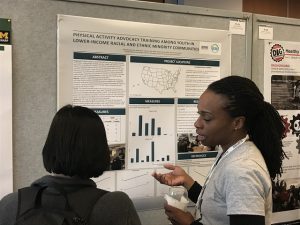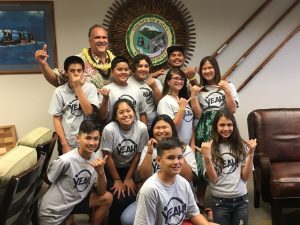Physical Activity Advocacy Training Among Youth in Lower-Income Racial and Ethnic Minority Communities
By: Nisha Botchwey, PhD and Katie O’Connell, MCRP, Georgia Tech School of City and Regional Planning
The panoramic views of the Canadian Rockies offered a spectacular backdrop for conversations led by our Georgia Tech research team about the “Physical Activity Advocacy Training Among Youth in Lower-Income Racial and Ethnic Minority Communities” poster presented at the 2018 Active Living Research Conference (ALR) in Banff in February 2018.

Our work grows out of the Physical Activity Research Center and its goal to create safe and appropriate physical activity spaces for youth with a focus on low resource, ethnic and racial minority youth. The Youth Engagement and Action for Health (YEAH) curriculum was originally designed by the San Diego County Childhood Obesity Initiative to train youth to assess their neighborhoods and develop advocacy plans to promote health promoting changes. Our team modified the curriculum to focus on physical activity and to study the ways advocacy-training can address disparities in lower-income racial and ethnic minority youth. At the time of the conference, there were six completed clubs, located in suburban Virginia around D.C., Los Angeles, Miami, rural north Georgia, and Charlottesville, VA.
We used pre and post survey questions to understand students’ changing perceptions around leadership, physical activity, and healthy schools/communities. The three largest increases were reported in the number of students who felt they were leaders, those that participated in more than 60 minutes of physical activity in the past 7 days, and those who enjoyed talking in front of groups. For example, 37 percent of students felt they were leaders at the start of the project compared with 62 percent at the end. We also found a 23 percent increase in the number of students that felt they could ask others to help make their school/community healthier.
After YEAH site completions, we interviewed adult leaders as well as the decision makers that received presentations from the students. Everyone gave us positive reviews about the project. One leader thought, “It was a great program that gave interactive lessons about themselves (the youth) and their community”. Another appreciated the students taking their research questions to a higher level as well as to watch them grow, especially around communication skills. One leader was surprised by the students’ enthusiasm for the project.
Given the recent social movements, especially that led by youth, the youth empowerment aspects of the project were received with great enthusiasm. People wanted to know about student motivations and their level of agency in going through the curriculum and targeting a physical activity challenge to solve. They were also interested in bringing YEAH back to their communities and eagerly anticipated a revised curriculum that incorporated lessons from our study.

We now have twenty-six clubs in progress across the U.S. including Miami, Maine, Hawaii, Saipan, and Atlanta. With approximately 300 participants, we will be able to look at our data across ethnicities, ages, geographies, and genders. The YEAH results will be published in academic journals but also converted into resources designed for youth serving organizations to support youth advocacy for physical activity promotion. Long-term, we believe the data gathered around YEAH can help make policy changes. Being at the Mountaintop in Banff allowed us to truly take an extended view of our work and ALR as the “premier venue for policy-relevant research and cross-sector exchange between scientists, practitioners and policy makers on how to create and sustain active living environments” provided a solid foundation and elevated conversations to inspire additional analyses, future research questions and community impact.
